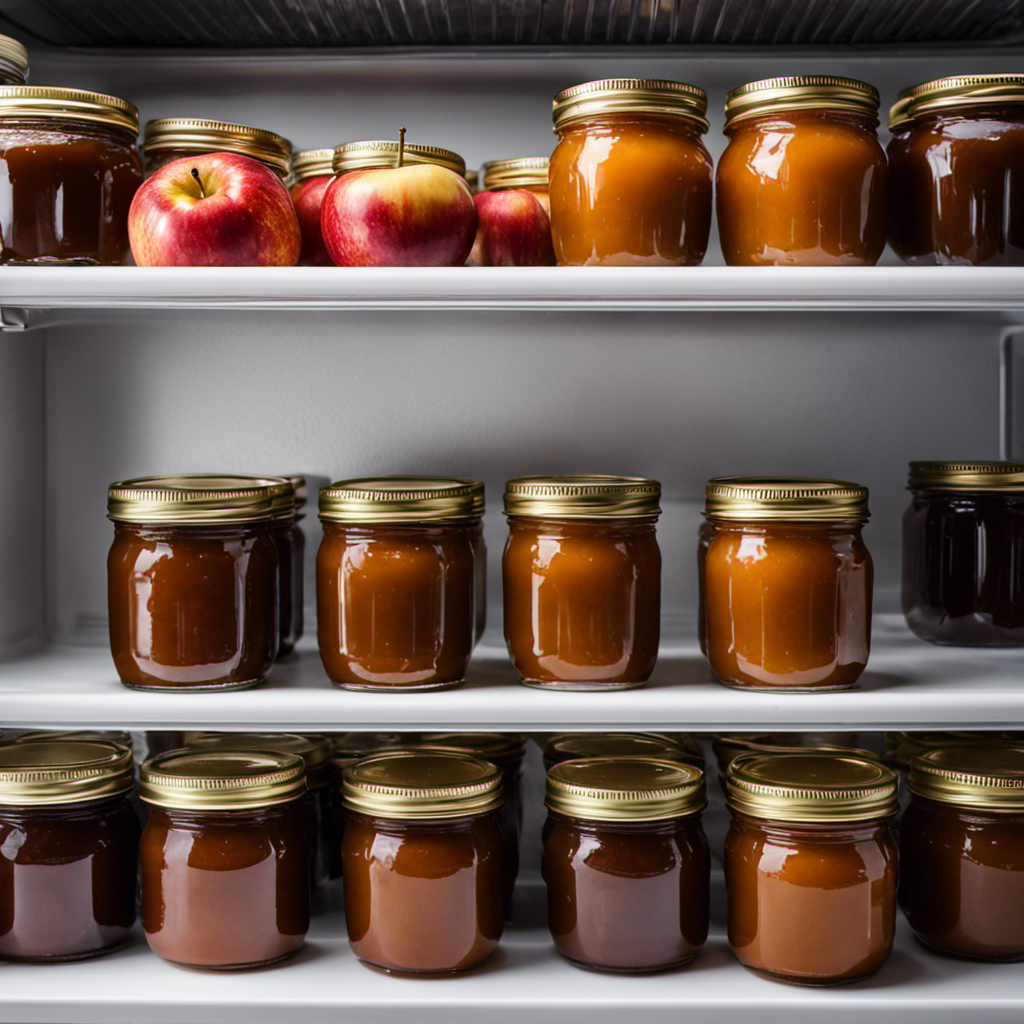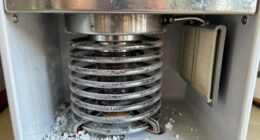I consider myself a big fan of apple butter, and I love putting this sweet and tangy treat on various foods like toast and pancakes. However, I always wonder: how long can homemade apple butter be kept in the refrigerator?
Well, fear not fellow apple butter enthusiasts, because in this article, I’ll delve into the factors that affect its longevity, proper storage techniques, and signs of spoilage.
So grab your jar of homemade apple butter and let’s uncover the secrets to keeping it fresh and delicious for as long as possible.
Key Takeaways
- Homemade apple butter typically lasts for 2-3 weeks in the fridge.
- Properly seal it in an airtight container to prevent air and moisture.
- Storage temperature is crucial, as higher temperatures accelerate spoilage.
- Preservatives and additives can extend the lifespan by inhibiting bacterial growth.
Shelf Life of Homemade Apple Butter in the Fridge
You should know that homemade apple butter typically lasts for about 2-3 weeks in the fridge.
When it comes to storing homemade apple butter, there are a few key factors to consider.
First, it is important to properly seal the apple butter in an airtight container to prevent any air or moisture from entering. This will help extend its shelf life.
Additionally, storing the apple butter in the coldest part of the fridge, such as the back or bottom shelf, can also help prolong its freshness.
In comparison to store-bought apple butter, homemade apple butter tends to have a shorter shelf life. This is because homemade apple butter often lacks preservatives that are commonly added to store-bought varieties.
Therefore, it is important to consume homemade apple butter within the recommended time frame to ensure its quality and taste.
Factors Affecting the Longevity of Homemade Apple Butter in the Fridge
When it comes to the longevity of homemade apple butter in the fridge, there are several key factors to consider.
One of the most important factors is the storage temperature, as higher temperatures can accelerate spoilage and reduce the shelf life.
Additionally, the use of preservatives and additives can play a significant role in extending the lifespan of homemade apple butter by inhibiting the growth of bacteria and other microorganisms.
Therefore, understanding the impact of storage temperature and the role of preservatives and additives is crucial for ensuring the longevity of homemade apple butter in the fridge.
Storage Temperature Impact
To maximize the shelf life of homemade apple butter, keep it stored in the fridge at a consistent temperature. Proper storage temperature plays a crucial role in preserving the freshness and quality of homemade apple butter. When stored in the fridge, the cool temperature helps slow down the growth of bacteria and other microorganisms that could cause spoilage.
Additionally, refrigeration minimizes the impact of air exposure, which can lead to oxidation and degradation of the apple butter. By sealing the apple butter in an airtight container and storing it in the fridge, you can extend its shelf life significantly.
However, it’s important to note that even with proper storage, homemade apple butter will eventually spoil. In the next section, we will explore the role of preservatives and additives in prolonging the longevity of homemade apple butter.
Preservatives and Additives Role
Using preservatives and additives can significantly prolong the shelf life of your homemade apple butter. Preservatives play a crucial role in preventing spoilage by inhibiting the growth of bacteria, yeast, and mold. Some common preservatives used in apple butter include citric acid, ascorbic acid, and potassium sorbate. These ingredients help maintain freshness and prevent the growth of harmful microorganisms.
Additives, on the other hand, enhance the flavor, texture, and appearance of the apple butter. Some common additives used in apple butter include cinnamon, nutmeg, and cloves. These spices not only add a delightful taste but also provide antioxidant properties.
Overall, the use of preservatives and additives in homemade apple butter ensures that it stays safe to consume for a longer period of time.
Proper Storage Techniques for Homemade Apple Butter in the Fridge
When it comes to homemade apple butter, understanding its shelf life is essential in preventing spoilage and waste.
Proper storage techniques can significantly extend the longevity of apple butter in the fridge, ensuring its freshness and flavor for a longer period.
Shelf Life of Apple Butter
You should check the expiration date on your homemade apple butter to ensure it is still good to eat. When it comes to the shelf life of apple butter, several factors can affect its spoilage. Here are some key points to consider:
- Ingredients: The quality and freshness of the ingredients used can impact the longevity of apple butter.
- Temperature: Storing apple butter at the proper temperature, ideally below 40°F (4°C), can help prevent spoilage.
- Air exposure: Seal the jar tightly after each use to minimize air exposure and reduce the chances of bacterial growth.
- Contamination: Avoid introducing contaminants into the jar, such as using dirty utensils or double-dipping.
- Storage duration: Homemade apple butter can typically last for 2 to 3 months in the fridge, but it’s important to check for any signs of spoilage before consuming.
Preventing Spoilage and Waste
Following proper storage techniques and being mindful of factors that can affect spoilage can help extend the shelf life of your homemade apple butter and prevent unnecessary waste.
Food preservation is crucial in minimizing waste, especially when it comes to perishable items like apple butter. To ensure its freshness, it is important to store apple butter in airtight containers in the refrigerator. This helps maintain its flavor and texture for a longer period.
Additionally, keeping the apple butter away from direct sunlight and extreme temperatures can also contribute to its longevity. It is recommended to check for any signs of spoilage, such as mold or off odors, before consuming the apple butter.
Signs of Spoilage in Homemade Apple Butter in the Fridge
If your homemade apple butter starts to develop mold or an off smell, it may be a sign of spoilage. To ensure the longevity of your apple butter in the fridge, proper storage methods and vigilant monitoring are crucial. Here are some signs to look out for when determining if your apple butter has spoiled:
- Mold growth on the surface
- Visible discoloration or dark spots
- Foul or rancid smell
- Strange texture, such as clumps or separation
- Bubbling or fizzing
These indicators suggest that the apple butter has undergone changes that may compromise its quality and safety. By recognizing these signs early on, you can avoid consuming spoiled apple butter and prevent any potential health risks.
Now, let’s explore how to extend the lifespan of homemade apple butter in the fridge.
Extending the Lifespan of Homemade Apple Butter in the Fridge
To make your homemade apple butter last longer in the fridge, it’s important to store it in a tightly sealed container. Proper storage containers play a vital role in preserving the freshness and taste of your apple butter.
Glass jars with airtight lids are a popular choice as they provide an effective barrier against air and moisture. Mason jars, for instance, are excellent for storing homemade apple butter due to their tight sealing capabilities. When choosing a container, opt for one that is specifically designed for food storage to ensure optimal freshness.
Additionally, make sure to label your container with the date of preparation to keep track of its expiration date. By following these guidelines, you can extend the lifespan of your homemade apple butter and enjoy its delicious flavors for a longer period of time.
Now that we’ve discussed the importance of proper storage containers, let’s explore some common mistakes to avoid when storing homemade apple butter in the fridge.
Common Mistakes to Avoid When Storing Homemade Apple Butter in the Fridge
One common mistake when storing your homemade apple butter in the fridge is not using a tightly sealed container, which can lead to air exposure and spoilage. To preserve the quality of your apple butter and prevent mold, it’s important to follow these guidelines:
- Use glass jars with airtight lids to seal your apple butter properly.
- Make sure to clean the jars thoroughly before filling them with the apple butter.
- Leave a small amount of headspace at the top of the jar to allow for expansion during freezing.
- Store the apple butter in the coldest part of your fridge, such as the back or bottom shelf.
- Avoid placing the apple butter near strong-smelling foods, as it can absorb odors.
Recommended Temperature for Storing Homemade Apple Butter in the Fridge
When it comes to storing homemade apple butter in the fridge, the recommended storage temperature is crucial for maintaining its freshness and quality.
The optimal temperature for storing apple butter is between 35-40°F (2-4°C). This temperature range helps to slow down the growth of bacteria and other microorganisms that can lead to spoilage.
It is essential to maintain a consistent temperature within this range to ensure the longevity of your apple butter. Fluctuations in temperature can accelerate the rate of spoilage and may result in a shorter shelf life.
Therefore, it is recommended to use a refrigerator thermometer to monitor the temperature and make necessary adjustments if needed.
How to Tell if Homemade Apple Butter in the Fridge Is Still Good to Eat
If you’re unsure if your homemade apple butter is still good to eat, check for any unusual smells or mold growth. Here are some ways to tell if your apple butter has gone bad:
-
Expiration date: Check the expiration date on the jar or container. If it has passed, it’s best to discard the apple butter.
-
Texture: If the apple butter has become watery or separated, it is a sign that it has spoiled and should not be consumed.
-
Color: If the apple butter has developed a dark or unusual color, it may indicate spoilage.
-
Taste: If the apple butter tastes off or has a sour flavor, it is a clear sign that it has gone bad.
-
Storage conditions: If the apple butter has been stored improperly, such as being left out in warm temperatures, it is more likely to spoil.
Tips for Maximizing the Freshness of Homemade Apple Butter in the Fridge
To keep your homemade apple butter fresh in the fridge, make sure to store it in an airtight container. Maximizing flavor and avoiding contamination are key to preserving the quality of your apple butter.
Firstly, ensure that the container you choose is clean and free from any lingering odors. This will prevent any unwanted flavors from seeping into your apple butter.
Additionally, store the container in the coldest part of the fridge, such as the back or bottom shelf, as this will help maintain the freshness for a longer period.
It is also important to avoid using dirty utensils when scooping out the apple butter, as this can introduce bacteria and cause contamination.
Frequently Asked Questions
Can Homemade Apple Butter Be Stored in the Freezer Instead of the Fridge?
Yes, homemade apple butter can be stored in the freezer instead of the fridge. Freezing apple butter is a great alternative storage option as it can extend its shelf life for several months without compromising its taste and quality.
Can I Store Homemade Apple Butter in a Plastic Container Instead of a Glass Jar?
I prefer using glass jars to store homemade apple butter because they provide a better seal and help preserve the flavor. Plastic containers can be used, but they may not be as effective in maintaining freshness.
Can I Add Spices or Other Ingredients to Homemade Apple Butter to Extend Its Shelf Life?
I can extend the shelf life of homemade apple butter by adding preservatives during the canning process. This will ensure that the apple butter stays fresh for a longer period of time.
Can I Still Eat Homemade Apple Butter if It Has Been Stored in the Fridge for Longer Than the Recommended Time?
If homemade apple butter has been stored in the fridge for longer than recommended, it may have gone bad. To tell, check for mold, off smells, or changes in texture. It’s not safe to eat expired apple butter.
Can I Use Homemade Apple Butter if It Has Changed Color or Developed a Strange Odor in the Fridge?
If my homemade apple butter has changed color or developed a strange odor in the fridge, I should not use it. It could be a sign of spoilage, which can cause food poisoning.
Conclusion
After all the hard work and patience that goes into making homemade apple butter, it’s important to make it last as long as possible in the fridge. By following proper storage techniques, paying attention to signs of spoilage, and avoiding common mistakes, you can extend the lifespan and maximize the freshness of your apple butter.
Remember, every jar of apple butter holds the sweet memories of autumn and the comforting taste of homemade goodness. Treat it with care, and it will continue to bring joy to your taste buds for weeks to come.









